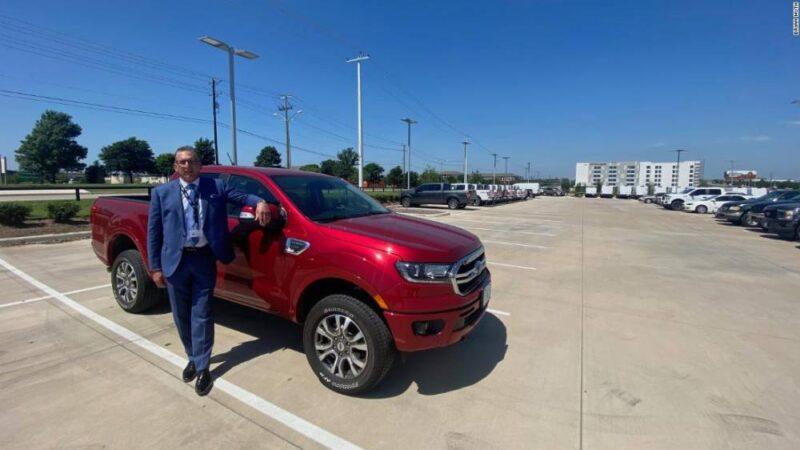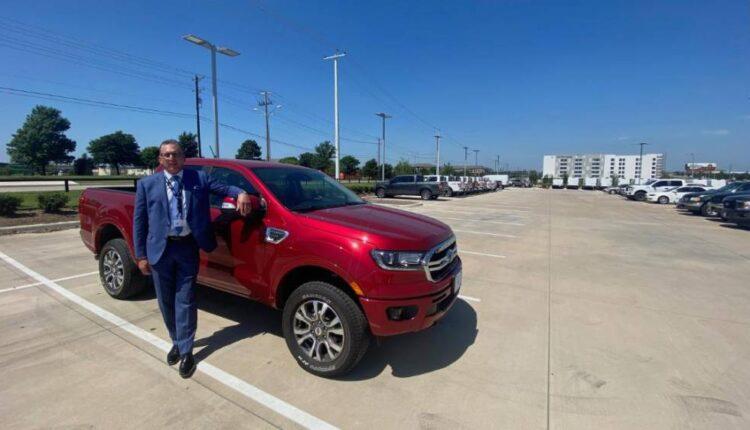(CNN)It’s getting easier to shop for a new car again now that dealerships across the United States are starting to open up following the coronavirus lockdowns. But don’t go shopping with your heart set on anything specific. It’s going to be harder to find the exact car, truck or SUV of your dreams.
Even though dealer showrooms were closed in many places, customers could still buy cars online and have them delivered to their home during the shutdowns. Many shoppers were attracted to the remarkable 0% financing and long-term auto loans — a combination that made for low monthly payments — being offered by auto lenders. And that helped to clean out dealers’ lots.”I don’t think they realized how well [the financing deals were] going to work,” said David Siebenaller, general manager at Findlay Chrysler Dodge Jeep Ram in Findlay, Ohio. “And then now that’s where we’re running into, you know. New car inventories are so short, everywhere.”
In an ordinary month, 0% financing deals represent about 2% of all new car sales, said Michelle Krebs, senior analyst at Cox Automotive. But in April, more than one in five cars were sold with 0% financing, she said. With auto factories shut down for weeks, there has been no new inventory to replace the cars the dealerships have sold. Read MoreOrdinarily, if Siebenaller didn’t have the exact car or truck someone wanted, he could call around to other area dealers and arrange to trade something for it. Now even that has become difficult, he said.”What we have found is that supplies are at their lowest levels in 18 months,” said Krebs.Almost all of the major auto makers have restarted production at their US factories, but it will still be weeks before the products roll onto dealer lots, dealers said. Also, factory restarts have been fitful and slow, said Jessica Caldwell, an industry analyst with Edmunds.com. After vehicles are built, it takes time for them to be distributed from the factory to dealers across the nation.”Under normal circumstances, it’s usually six to eight weeks,” said Siebenaller. “As low and depleted as that pool is right now of vehicles, I don’t know, nobody knows really, what to expect.”Some dealers did surprisingly well during the pandemic, particularly those that created strong online sales channels before the crisis struck.

Brian Huth of Sam Pack’s Five Star Ford in Texas stands next to one of the few Ford Rangers he has left to sell.In April, sales at Sam Pack’s Five Star Ford in Dallas, for instance, were 45% higher than April last year. And last year had already been a strong year, said general manager Brian Huth. In March, when the lockdowns first started, sales plummeted, he said. But once his dealership perfected a complete online shop-at-home system, sales quickly bounced back.”People have been looking at our inventory online for a long time, but actually being able to Amazon this thing to death is pretty awesome,” Huth said.Like many auto dealers, he had built up his inventories ahead of what is usually a strong spring selling season. Now, though, the once healthily full dealership lots are thinning out.”I’m in trouble,” he said. “I’m going to run out [Ford] Rangers.”The Ranger, Ford’s new mid-size pickup, which is smaller than the big F-150, has caught on with his truck loving Texas customers, Huth said. He has only four left He’s also concerned about his shrinking number of Mustangs, a popular model that sells especially well in the spring. His dealership is also “dangerously low” on Ford Explorer and Escape SUVs, he said.He has space on his lots for as many as 1,300 cars, but currently has only about 550 in stock, he said.Not every auto dealer is in such a crisis. Thanks to having built up inventory before the pandemic, Jones Junction Auto Group in Bel Air, Maryland, has enough vehicles to last until new ones start coming in, said Jeff Ramsey, e-commerce director for the dealership, which sells cars from Fiat Chrysler Automobiles, Hyundai, Kia, Nissan, Subaru and Toyota.”We have less than we typically would carry at this point in the season,” Ramsey said, “But to the factory’s credit, they’ve stayed in communication with us. They’ve let us know when to expect vehicles to come in.”‘In general, there aren’t shortages on all makes and models, Caldwell said. But inventories are tight on the most popular ones, such as General Motors’ Chevrolet and GMC SUVs and pickups. Trucks are particularly an issue, she said, because they come in so many varieties.
“Between the beds and the cabs and the all-wheel-drive, there’s millions of configurations,” she said.That means that even if there were, say, 15 trucks on a dealer’s lot, finding the one you want — even before the pandemic — would have been tough. Now, it’s going to be very tough.
Source: edition.cnn.com

